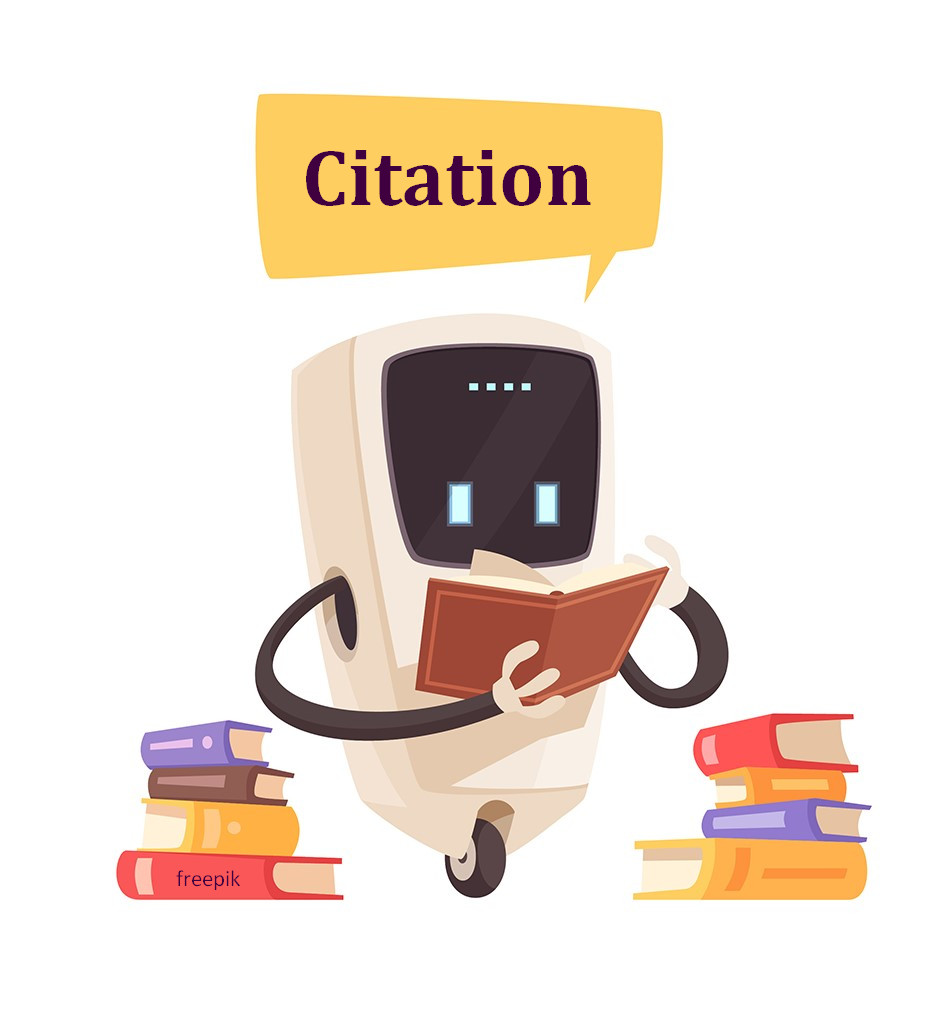如何引用ChatGPT生成內容?
最近更新日期:2025年7月18日
若您查核AI生成的內容屬實,不涉及抄襲或違反著作權,並獲得指導教授、期刊編輯或出版單位的認可,確定能夠在研究論文中運用ChatGPT、Gemini、Midjourney、DALL-E……等AI工具所生成的文字或圖像,應該如何引用呢?
對於引用生成式AI的內容,目前APA、MLA、Chicago Manual Style已經發布較明確的規範與實例,提供寫作者參考;期刊出版社也陸續發表相關聲明,提醒投稿者留意。本文彙整學術引用格式官方網站、國外大學圖書館的指引,以及出版社網頁的資訊。
If you are considering including AI-generated content in your academic work, be sure to verify that the information is factually accurate. Ensure that it does not involve plagiarism or violate copyright rules. You should also seek approval from your advisor, journal editor, or publisher before incorporating text or images created by tools such as ChatGPT, Gemini, Midjourney, or DALL-E into your research papers.
Currently, major citation styles such as APA, MLA, and The Chicago Manual of Style have released clearer guidelines and examples for citing generative AI. Many academic publishers have also issued statements to advise authors on proper usage. This blog post compiles guidance from official citation style websites, university library resources abroad, and publisher announcements.
- 引用格式官方網站 (Official Citation Style Websites)
- 海外大學圖書館指引 (Guidelines from University Libraries Abroad)
- 出版社與學會 (Publishers and Academic Societies)
- 學術組織 (Scholarly Organizations)
- 國內學術與政府機構網站 (Academic and Government Institutions in Taiwan)
- 參考資料 (References)
- 總結 (Conclusion)
—
1. 引用格式官方網站 (Official Citation Style Websites)
- APA格式 (American Psychological Association Style)
APA Style Blog: How to cite ChatGPT.
https://apastyle.apa.org/blog/how-to-cite-chatgpt
- MLA格式 (Modern Language Association Style)
MLA Style Center: How do I cite generative AI in MLA style?
https://style.mla.org/citing-generative-ai/
- Chicago Manual Style
The Chicago Manual of Style Online: How do you recommend citing content developed or generated by artificial intelligence, such as ChatGPT? https://www.chicagomanualofstyle.org/qanda/data/faq/topics/Documentation/faq0422.html
2. 海外大學圖書館指引 (Guidelines from University Libraries Abroad)
| 學校 | 網頁 | 引用格式實例 |
| The University of British Columbia | Generative AI and ChatGPT | APA, Chicago, IEEE, MLA, Vancouver |
| New Jersey Institute of Technology | Citing ChatGPT and other AI generated content | APA, Chicago, IEEE, MLA |
| The University of Queensland | ChatGPT and other generative AI tools | APA, AGLC, Chicago, MLA, Vancouver |
| Victoria University | IEEE Referencing: Generative AI | IEEE |
| University of Waterloo Library | ChatGPT and Generative Artificial Intelligence (AI): AI-generated content and citation | APA, Chicago, IEEE, JAMA, MLA |
| Purdue University Library | How to Cite AI Generated Content | APA, Chicago, IEEE, MLA |
| James Cook University Library | Citing material created by AI software | APA, AMA, AGLC, Harvard, MLA, IEEE, Chicago |
| University of Maryland Library | Artificial Intelligence (AI) and Information Literacy | – |
| 澳門科技大學圖書館 | 生成人工智能與資訊素養 | – |
3. 出版社與學會 (Guidelines from University Libraries Abroad)
| 出版社 | 網頁說明 |
| American Chemical Society (ACS) | Best Practices for Using AI When Writing Scientific Manuscripts |
| American Psychological Association (APA) | APA policy on the use of generative artificial intelligence (AI) in scholarly materials |
| Cambridge University Press | AI Contributions to Research Content |
| Elsevier | Generative AI policies for journals |
| IEEE | The Risks and Benefits of Chat GPT; Guidelines for Artificial Intelligence (AI)-Generated Text |
| Nature | Artificial Intelligence (AI) |
| SAGE | Artificial Intelligence Policy |
| Science | Science Journals: Editorial Policies |
| Springer | Artificial Intelligence (AI) |
| Taylor & Francis | AI Policy |
| Wiley | Artificial Intelligence |
| 台灣內科醫學會 | 使用生成式AI(如ChatGPT)產生之科學性著作(含論文)倫理原則之使用規範及共識 |
| 台灣護理學會 | 護理雜誌投稿簡則 |
| 中華民國體育學會 | 中華體育季刊、體育學報對人工智慧(AI)之聲明 |
| 編譯論叢 | 國家教育研究院編譯論叢徵稿辦法 |
4. 學術組織 (Scholarly Organizations)
- COPE (The Committee on Publication Ethic, 出版道德委員會): Authorship and AI tools.
https://publicationethics.org/cope-position-statements/ai-author - ICMJE (International Committee of Medical Journal Editors, 國際醫學期刊編輯委員會):
Artificial Intelligence (AI)-Assisted Technology.
https://www.icmje.org/recommendations/browse/roles-and-responsibilities/defining-the-role-of-authors-and-contributors.html
5. 國內學術與政府機構網站 (Academic and Government Institutions in Taiwan)
- 教育部臺灣學術倫理教育資源中心(2023年12月28日)。議題教材包【05】生成式AI應用於教學與研究。https://ethics.moe.edu.tw/packagepost/detail/5/
- 臺灣大學針對生成式AI工具之教學因應措施。https://www.dlc.ntu.edu.tw/ai-tools/
- 國立成功大學AI及相關學習工具參考指南。https://sites.google.com/gs.ncku.edu.tw/nckuaiguidance/
- 國立政治大學生成式AI簡要原則。https://sites.google.com/g.nccu.edu.tw/nccubasicprincipleforai
- 國立陽明交通大學因應生成式AI之指引及教學建議。 https://oaeri.nycu.edu.tw/oaeri/ch/app/news/view?module=headnews&id=2063&serno=61732a70-61d7-47bf-916a-9834ccab82c8
- 國立臺灣師範大學 – 生成式AI之學習應用及參考指引。https://ctld.ntnu.edu.tw/generative_ai
- 國家科學及技術委員會。行政院及所屬機關(構)使用生成式AI參考指引。https://www.nstc.gov.tw/folksonomy/list/c79bf57b-dc94-4aff-8d14-3262b5559cfc?l=ch
期刊文章與網頁
- Casal, J. E., & Kessler, M. (2023). Can linguists distinguish between ChatGPT/AI and human writing?: A study of research ethics and academic publishing. Research Methods in Applied Linguistics, 2(3), 100068. https://www.sciencedirect.com/science/article/pii/S2772766123000289?via%3Dihub
- Caulfield, J. (2023, August 15). ChatGPT Citations | Formats & Examples. Scribbr. https://www.scribbr.com/ai-tools/chatgpt-citations/
- Conroy, G. (2023, September 8). Scientific sleuths spot dishonest ChatGPT use in papers. Nature. https://nature.com/articles/d41586-023-02477-w
- Currie, G. M. (2023). Academic integrity and artificial intelligence: Is ChatGPT hype, hero or heresy? Seminars in Nuclear Medicine, 53 (5), 719‒730.
- Lin, Z. (2024). Towards an AI policy framework in scholarly publishing. Trends in Cognitive Sciences, 28(2), 85-88. https://doi.org/10.1016/j.tics.2023.12.002
- Nature (2023, January 24). Tools such as ChatGPT threaten transparent science; here are our ground rules for their use. Nature, 613. https://www.nature.com/articles/d41586-023-00191-1
- Walters, W. H. & Wilder, E. I. (2023). Fabrication and errors in the bibliographic citations generated by ChatGPT. Scientific Reports, 13, 14045. https://www.nature.com/articles/s41598-023-41032-5
- 百世經綸(2025年3月1日)。學術論文中ChatGPT的APA格式引用指南。
百世經綸的閱讀窩。https://vocus.cc/article/67c0fc3bfd8978000152efc8 - 陳亭瑋(2023年3月15日)。ChatGPT可以被列為論文作者嗎?學術期刊發布相關使用規則。科學月刊,495。https://www.scimonth.com.tw/archives/6341
- 章忠信(2023年5月31日)。生成式AI的智慧財產權Q&A。著作權筆記。http://www.copyrightnote.org/ArticleContent.aspx?ID=9&aid=3141
- 章忠信(2023年8月4日)。學術倫理、智慧財產權與AI。著作權筆記。http://www.copyrightnote.org/ArticleContent.aspx?ID=9&aid=3150
演講簡報/錄影
- 潘璿安(2024年5月8日)。生成式 AI 衍生的學術倫理議題及相關教學推廣。CONCERT Open Future Communication焦點論壇⑦—AI與學術服務的整合視訊演講。https://concert.stpi.narl.org.tw/web.seminar/detail/sn/4
- 柯皓仁(2024年8月27日)。從AI在圖書館的應用談館員應具備的AI知能。CONCERT Open Future Communication焦點論壇⑧-圖書館員與AI素養。https://concert.stpi.narl.org.tw/web.seminar/detail/sn/5
- 佘秀清(2024年8月27日)。Deconstructing AI Literacy for Librarians。CONCERT Open Future Communication焦點論壇⑧-圖書館員與AI素養。https://concert.stpi.narl.org.tw/web.seminar/detail/sn/5
- 賴文智(2024年12月6日)。圖書館導入生成式AI的法律風險控管。AI在圖書館的應用研討會。https://www.is-law.com/generative-ai-and-libraries-legal-risks-and-implementation/
- 林誠夏(22025年4月21日)。生成式AI創作的權利保障與合理揭露。臺灣大學寫作教學中心。https://awec.ntu.edu.tw/%e6%bc%94%e8%ac%9b-%e7%94%9f%e6%88%90%e5%bc%8fai%e5%89%b5%e4%bd%9c%e7%9a%84%e6%ac%8a%e5%88%a9%e4%bf%9d%e9%9a%9c%e8%88%87%e5%90%88%e7%90%86%e6%8f%ad%e9%9c%b2/
綜上所述,關於生成式AI在寫作方面的運用,請誠實說明你如何運用此工具做發想或規劃,即使你沒有直接複製內文到你的報告中。由於AI生成內容的資料來源無法回溯,不一定能取得直接連結,建議您截圖備份、另存新檔,並標示使用日期。此外,請勿引用 ChatGPT 作為事實資訊的來源(如:名詞解釋的定義),因AI生成的資訊不一定正確,僅是文字接龍,內容具隨機性,不一定即時搜尋網路,務必謹慎查證!
最後,提醒您繳交課程作業、投稿論文前,務必再次前往引文格式官網或出版社網站確認最新規定!
延伸閱讀:ChatGPT自動生成的參考文獻真假難辨,不可不慎!
作者:陳芷洛
本文更新歷程
陳芷洛 2024/3/25, 2024/9/13, 2024/9/20, 2024/11/20, 2024/12/13, 2025/5/29, 2025/7/18
【教學影片】

